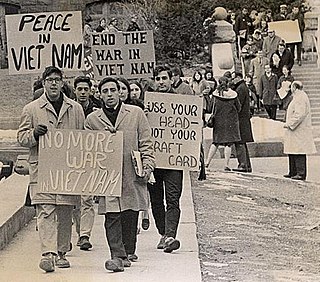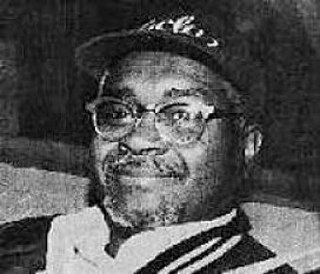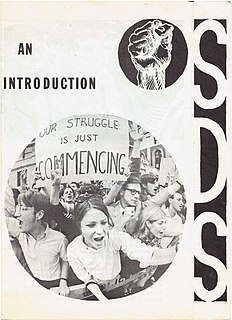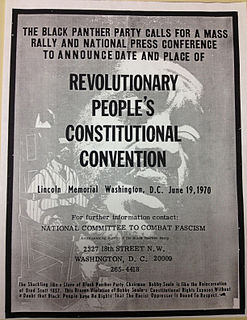A resistance movement is an organized effort by some portion of the civil population of a country to withstand the legally established government or an occupying power and to disrupt civil order and stability. It may seek to achieve its objectives through either the use of nonviolent resistance, or the use of force, whether armed or unarmed. In many cases, as for example in Norway in the Second World War, a resistance movement may employ both violent and non-violent methods, usually operating under different organizations and acting in different phases or geographical areas within a country.

Kwame Ture was a prominent Caribbean-American organizer in the civil rights movement in the United States and the global Pan-African movement. Born in Trinidad, he grew up in the United States from the age of 11 and became an activist while attending Howard University. He eventually developed the Black Power movement, first while leading the Student Nonviolent Coordinating Committee (SNCC), later serving as the "Honorary Prime Minister" of the Black Panther Party (BPP), and lastly as a leader of the All-African People's Revolutionary Party (A-APRP).

David T. Dellinger was an influential American radical pacifist and an activist for nonviolent social change. He achieved peak notoriety as one of the Chicago Seven, who were put on trial in 1968.

Draft evasion is any successful attempt to elude a government-imposed obligation to serve in the military forces of one's nation. Sometimes draft evasion involves refusing to comply with the military draft laws of one's nation. Illegal draft evasion is said to have characterized every military conflict of the 20th and 21st centuries. Such evasion is generally considered to be a criminal offense, and laws against it go back thousands of years.

Conscription in the United States, commonly known as the draft, has been employed by the federal government of the United States in five conflicts: the American Revolutionary War, the American Civil War, World War I, World War II, and the Cold War. The fourth incarnation of the draft came into being in 1940 through the Selective Training and Service Act. It was the country's first peacetime draft. From 1940 until 1973, during both peacetime and periods of conflict, men were drafted to fill vacancies in the United States Armed Forces that could not be filled through voluntary means. The draft came to an end in 1973 when the United States Armed Forces moved to an all-volunteer military. However, the Selective Service System remains in place as a contingency plan; all male U.S. citizens, regardless of where they live, and male immigrants, whether documented or undocumented, residing within the United States, who are 18 through 25 are required to register. United States Federal Law also provides for the compulsory conscription of men between the ages of 17 and 45 and certain women for militia service pursuant to Article I, Section 8 of the United States Constitution and 10 U.S. Code § 246.
The American Deserters Committee (ADC) of Montreal, Quebec, Canada was a group of American Armed Forces members who deserted their posts and went to Canada to avoid the Vietnam War. The deserters were aided in their efforts by groups such as Students for a Democratic Society, the Black Panthers, the Revolutionary Union, The Resistance, American Friends Service Committee, War Resisters League and the Committee for Peace and Freedom.

The Progressive Labor Party (PLP) is a Marxist–Leninist political party based primarily in the United States. It was established in January 1962 as the Progressive Labor Movement following a split in the Communist Party USA, adopting its new name at a convention held in the spring of 1965. It played a vocal role in the anti-Vietnam War movement of the 1960s and early 1970s through its Worker Student Alliance faction of Students for a Democratic Society. Following the end of American involvement in Vietnam, the PLP emerged as one of the leading anti-revisionist communist organizations in the United States. The PLP publishes a weekly newspaper, Challenge.

Protests against the Vietnam War took place in the 1960s and 1970s. The protests were part of a movement in opposition to United States involvement in the Vietnam War, and as such took place mainly in the U.S.

Opposition to United States involvement in the Vietnam War began with demonstrations in 1964 against the escalating role of the United States in the Vietnam War and grew into a broad social movement over the ensuing several years. This movement informed and helped shape the vigorous and polarizing debate, primarily in the United States, during the second half of the 1960s and early 1970s on how to end the war.
Black anarchism is a political ideology applied to a group of people of African descent who identify with the principles of anarchism. These people include, but are not limited to: Ashanti Alston, Lorenzo Kom'boa Ervin, Kuwasi Balagoon, Greg Jackson, and Martin Sostre. Critics of the ideology suggest that it broadly eclipses important political differences between these multi-varied thinkers, and incorrectly presents them as having a shared theory or movement. Ultimately, black anarchism is a term that many of these individuals do not all accept.

Lorenzo Kom'boa Ervin is an American writer, activist, and black anarchist. He is a former member of the Black Panther Party and Concerned Citizens for Justice. He was born in Chattanooga, Tennessee, and has lived in Memphis, Tennessee, since 2010.
The abbreviation or acronym RITA stands for "Resistance Inside the Army", "Resister Inside the Army", or "Resist! Inside the Army".

Internal resistance to apartheid in South Africa originated from several independent sectors of South African society and took forms ranging from social movements and passive resistance to guerrilla warfare. Mass action against the ruling National Party government, coupled with South Africa's growing international isolation and economic sanctions, were instrumental in leading to negotiations to end apartheid, which began formally in 1990 and ended with South Africa's first multiracial elections under a universal franchise in 1994..
The Berkeley protests or Berkeley Revolution were a conglomerated series of events at the University of California, Berkeley, and the wider area around Berkeley, California, in the 1960s. Many of these protests were a small part of the larger Free Speech Movement, which had national implications and constituted the onset of the counterculture era. These protests were headed under the informal leadership of students Mario Savio, Jack Weinberg, Brian Turner, Bettina Aptheker, Steve Weissman, Art Goldberg, Jackie Goldberg, and others.

The Black Panther Party (BPP), originally the Black Panther Party for Self-Defense, was a revolutionary political organization founded by Bobby Seale (Chairman) and Huey Newton in October 1966 in Oakland, California. The party was active in the United States from 1966 until 1982, with chapters in numerous major cities, and international chapters in the United Kingdom in the early 1970s, and in Algeria from 1969 to 1972.

Students for a Democratic Society (SDS) was a national student activist organization in the United States during the 1960s, and was one of the principal representations of the New Left. Disdaining permanent leaders, hierarchical relationships and parliamentary procedure, the founders conceived of the organization as a broad exercise in "participatory democracy." From its launch in 1960 it grew rapidly in the course of the tumultuous decade with over 300 campus chapters and 30,000 supporters recorded nationwide by its last national convention in 1969. The organization splintered at that convention amidst rivalry between factions seeking to impose national leadership and direction, and disputing "revolutionary" positions on, among other issues, the Vietnam War and Black Power.
RESIST is a philanthropic non-profit organization based out of Boston, Massachusetts. It has provided grants to grassroots activist organizations around the country since its inception in 1967 as a result of the anti-war proclamation "A Call to Resist Illegitimate Authority".
Revolutionary Action Movement (RAM) was a U.S.-based revolutionary black nationalist group in operation from 1962 to 1969. They were the first group to apply the philosophy of Maoism to conditions of black people in the United States and informed the revolutionary politics of the Black Power movement. RAM was the only secular political organization which Malcolm X joined prior to 1964. The group's political formation deeply influenced the politics of Huey Newton, Bobby Seale, and many other future influential Black Panther Party founders and members.

The Revolutionary People's Constitutional Convention (RPCC) was a conference organized by the Black Panther Party (BPP) that was held in Philadelphia from September 4–7, 1970. The goal of the Convention was to draft a new version of the United States Constitution and to unify factions of the radical left in the United States. The RPCC represented one of the largest gatherings of radical activists across movements and issues in the United States. The Convention was attended by a variety of organizations from the Black Power Movement, Asian American Movement, Chicano Movement, American Indian Movement, Anti-war movement, Women's Liberation, and Gay Liberation movements. Estimates of attendance range from 6,000 to 15,000. Attendees convened in workshops to draft declarations of demands related to various issues, which were ultimately intended to be incorporated into a new constitution which would function as the final vision of those movements. The RPCC also signified a shift in BPP focus from black self-defense to a broader revolutionary agenda. While conflicts did arise during the Philadelphia Convention, the conference was ultimately deemed a success by the Panthers. After the Philadelphia conference, attempts were made to reconvene to finalize and ratify the new constitution in Washington, DC a few months later but ultimately failed due to police interference and Panther disorganization.
The University of Virginia has a long history of student activists who formed radical environmental, religious, and political groups to champion various social changes. An especially intense period of student activism occurred in the 1970s during the May Days strikes against the Vietnam. War. More recently, the Curry School of Education and its Youth-Nex Center held a nation-wide conference in 2019 to promote student activism at UVA and beyond.